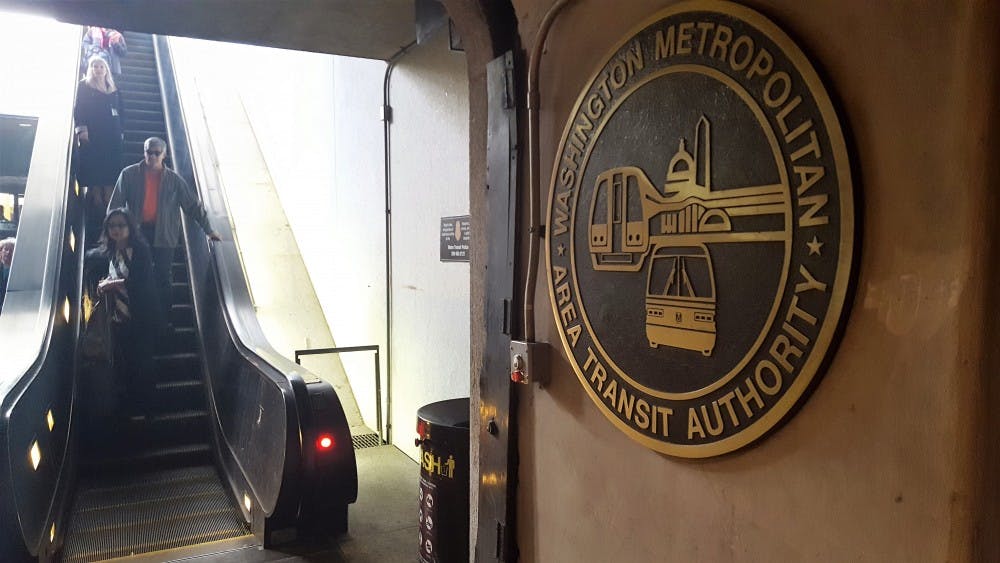It will take Tara Moriello, a junior in the School of Public Affairs, only six weeks to spend the amount of money she would have spent on the now-canceled U-Pass for her Metro commute from Tenleytown to a babysitting job in Capitol Hill.
That’s more than $6 a day, round trip, according to Washington Metro Area Transit Authority’s Trip Planner.
“It’s really disappointing, especially to know that so many of us who are staying in D.C. are technically stuck in leases and a lot of us can’t afford ... to bring a car to the city because it’s so expensive,” Moriello said. “For so many of us who rely on the U-Pass, that being taken away just hurts.”
Moriello isn’t the only student who’s disappointed by the U-Pass program cancellation, announced on Aug. 14 by Dan Nichols, assistant vice president of risk, safety and transportation programs. Students took to social media on Friday to express their anger and frustration about the decision, which signals the hiatus of a program that’s proved quite popular since its launch in 2016.
American University spokesperson Stacie Burgess told The Eagle in an email that between July 2018 and June 2019, AU students used the pass for 1,415,087 system rides, 67 percent of which were rail trips and 33 percent of which were bus trips.
According to Nichols, WMATA temporarily suspended the program as it was “not a viable option,” for the fall semester, despite AU’s pursuit of a modified version of the program that would have allowed students to opt in to the $136 pass if they returned to the District. Metro rail ridership decreased drastically following the onset of the coronavirus pandemic, logging about 58,000 rail entries on June 26 compared to nearly 693,000 on the same date last year.
WMATA spokesperson Sherri Ly told The Eagle in an email that the pandemic’s impact on in-person college attendance made the system unsustainable. The program has been suspended for all participating schools, she said, and students can find Metro pass options on the WMATA website.
“We look forward to resuming the program as soon as possible,” Ly wrote.
Moriello got her babysitting job with affordable Metro access in mind. The lack of the U-Pass program is now “a nuisance at best, a barrier at worst,” she said.
Lana Houle, a junior in the School of International Service, is just as worried. She quit her job at Kumon, a math and reading center in the area, to become a desk receptionist at AU, only to lose that job when the University went fully online for the fall semester.
Now, Houle has to limit her job search to neighborhoods she can travel to cheaply, instead of spending a portion of her income on the Metro.
While buses in the District are free to limit riders' contact with drivers, they aren’t as appealing in some cases, Houle and Moriello said. Different routes make commuting more complicated and require relearning how to move around the city.
The U-Pass program stood out to Houle when she applied to AU, setting it apart from other universities she considered. While it was by no means a deciding factor, the program certainly made AU more appealing.
Houle said it would be a huge help if the University provided resources to help with traveling around the District, like a FAQ, with details about bus routes, the AU shuttle and more transportation options.
In an email to the student body on Aug. 21, Acting Provost Peter Starr said that the AU shuttle would operate on a limited schedule, with morning and afternoon service on the Blue Line between Main Campus and Tenleytown/Washington College of Law. The Red Line to Spring Valley, along with additional service on the Blue Line, will be provided on demand by requests through the Rider app.
The Green Route between East Campus and Spring Valley, Starr wrote, will not operate this semester.
Burgess told The Eagle in an email that students should go to the transportation section of the University’s website to review travel options. AU has a partnership with Capital Bikeshare, she said, and students can get discounts on their rentals through AU’s site.
At this point, Houle sees herself stuck mostly in the Glover Park area, at least until she can figure out reliable forms of transportation.
“I have to limit my job search, limit my spending, so I can afford to take … public transportation,” Houle said. “That was one of the first things when AU went fully online, I was like, ‘I hope there’s still a U-Pass,’ because I still love D.C.”





